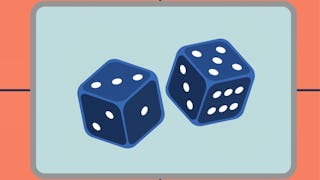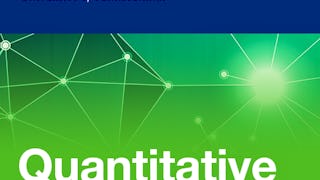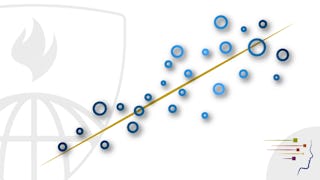- Browse
- Statistical Modeling
Statistical Modeling Courses Online
Master statistical modeling for predictive analytics. Learn to build and validate models for various types of data.
Explore the Statistical Modeling Course Catalog
 Status: NewNewStatus: PreviewPreviewO
Status: NewNewStatus: PreviewPreviewOO.P. Jindal Global University
Skills you'll gain: Sampling (Statistics), Statistical Analysis, Probability Distribution, Statistical Hypothesis Testing, Descriptive Statistics, Statistical Methods, Correlation Analysis, Regression Analysis, R (Software), R Programming, Statistical Modeling, Statistical Inference, Probability, Big Data, Decision Tree Learning
Build toward a degree
Mixed · Course · 1 - 3 Months
 Status: Free TrialFree TrialU
Status: Free TrialFree TrialUUniversity of Colorado Boulder
Skills you'll gain: Statistical Inference, Statistical Modeling, Statistical Hypothesis Testing, Regression Analysis, R Programming, Data Ethics, Research Design, Statistical Methods, Data Analysis, Statistical Analysis, Data Modeling, Predictive Modeling, Mathematical Modeling, Probability & Statistics, Data Science, Quantitative Research, Machine Learning, Classification And Regression Tree (CART), Linear Algebra, Probability Distribution
Build toward a degree
4.2·Rating, 4.2 out of 5 stars53 reviewsIntermediate · Specialization · 3 - 6 Months
 Status: Free TrialFree TrialU
Status: Free TrialFree TrialUUniversity of California, Santa Cruz
Skills you'll gain: Time Series Analysis and Forecasting, Bayesian Statistics, R Programming, Forecasting, Statistical Inference, Statistical Modeling, Technical Communication, Data Presentation, Statistics, Probability, Statistical Analysis, Statistical Software, Advanced Analytics, R (Software), Data Analysis, Mathematical Modeling, Microsoft Excel, Markov Model, Statistical Methods, Data Science
4.6·Rating, 4.6 out of 5 stars3.5K reviewsIntermediate · Specialization · 3 - 6 Months
 Status: Free TrialFree TrialU
Status: Free TrialFree TrialUUniversity of Pennsylvania
Skills you'll gain: Business Modeling, Mathematical Modeling, Regression Analysis, Statistical Modeling, Risk Analysis, Process Optimization, Forecasting, Predictive Analytics, Business Analytics, Simulation and Simulation Software, Probability, Vocabulary
4.6·Rating, 4.6 out of 5 stars9.3K reviewsMixed · Course · 1 - 4 Weeks
 Status: Free TrialFree TrialJ
Status: Free TrialFree TrialJJohns Hopkins University
Skills you'll gain: Statistical Hypothesis Testing, Sampling (Statistics), Regression Analysis, Bayesian Statistics, Statistical Analysis, Probability & Statistics, Statistical Inference, Statistical Methods, Statistical Modeling, Linear Algebra, Probability, R Programming, Biostatistics, Data Science, Statistics, Probability Distribution, Mathematical Modeling, Data Analysis, Applied Mathematics, Predictive Modeling
4.4·Rating, 4.4 out of 5 stars779 reviewsAdvanced · Specialization · 3 - 6 Months
 Status: Free TrialFree TrialJ
Status: Free TrialFree TrialJJohns Hopkins University
Skills you'll gain: Regression Analysis, Statistical Analysis, Statistical Modeling, Correlation Analysis, Data Analysis, Statistical Methods, Predictive Modeling, Probability & Statistics, Statistical Inference
4.4·Rating, 4.4 out of 5 stars3.4K reviewsMixed · Course · 1 - 4 Weeks
What brings you to Coursera today?
 Status: Free TrialFree TrialS
Status: Free TrialFree TrialSStanford University
Skills you'll gain: Bayesian Network, Applied Machine Learning, Graph Theory, Machine Learning Algorithms, Probability Distribution, Network Model, Statistical Modeling, Markov Model, Decision Support Systems, Machine Learning, Probability & Statistics, Network Analysis, Statistical Inference, Sampling (Statistics), Statistical Methods, Unstructured Data, Natural Language Processing, Algorithms, Computational Thinking, Test Data
4.6·Rating, 4.6 out of 5 stars1.5K reviewsAdvanced · Specialization · 3 - 6 Months
 Status: Free TrialFree TrialJ
Status: Free TrialFree TrialJJohns Hopkins University
Skills you'll gain: Statistical Inference, Statistical Hypothesis Testing, Probability & Statistics, Probability, Statistics, Bayesian Statistics, Statistical Methods, Statistical Modeling, Statistical Analysis, Probability Distribution, Sample Size Determination, Sampling (Statistics), Data Analysis
4.2·Rating, 4.2 out of 5 stars4.5K reviewsMixed · Course · 1 - 4 Weeks
 Status: Free TrialFree TrialU
Status: Free TrialFree TrialUUniversity of Minnesota
Skills you'll gain: Time Series Analysis and Forecasting, Predictive Modeling, Regression Analysis, Microsoft Excel, Forecasting, Pivot Tables And Charts, Data Transformation, Trend Analysis, Predictive Analytics, Data Cleansing, Statistical Methods, Performance Metric
4.8·Rating, 4.8 out of 5 stars140 reviewsMixed · Course · 1 - 4 Weeks
 Status: NewNewStatus: Free TrialFree Trial
Status: NewNewStatus: Free TrialFree TrialSkills you'll gain: Data-Driven Decision-Making, Minitab, Regression Analysis, Statistical Hypothesis Testing, Statistical Analysis, Scatter Plots, Correlation Analysis, Data Analysis, Predictive Analytics, Statistical Methods, Descriptive Statistics, Business Analytics, Predictive Modeling, Forecasting, Advanced Analytics, Statistical Modeling, Quantitative Research, Analytics, Case Studies, Exploratory Data Analysis
Beginner · Specialization · 1 - 3 Months
 Status: NewNewStatus: PreviewPreview
Status: NewNewStatus: PreviewPreviewSkills you'll gain: Feature Engineering, SAS (Software), Classification And Regression Tree (CART), Predictive Modeling, Statistical Modeling, Regression Analysis, Predictive Analytics, Applied Machine Learning, Statistical Methods, Data Processing, Data Manipulation, Data Cleansing, Data Transformation, Statistical Analysis, Exploratory Data Analysis
Mixed · Course · 1 - 4 Weeks
 Status: NewNewStatus: PreviewPreviewD
Status: NewNewStatus: PreviewPreviewDDuke University
Skills you'll gain: Data-Driven Decision-Making, Statistical Modeling, Predictive Modeling, Regression Analysis, R Programming, Data Analysis, Probability & Statistics, Statistical Hypothesis Testing, Statistical Inference, Statistical Analysis
Beginner · Course · 1 - 4 Weeks
Statistical Modeling learners also search
In summary, here are 10 of our most popular statistical modeling courses
- Statistical Methods and Data Analysis : O.P. Jindal Global University
- Statistical Modeling for Data Science Applications: University of Colorado Boulder
- Bayesian Statistics: University of California, Santa Cruz
- Fundamentals of Quantitative Modeling: University of Pennsylvania
- Advanced Statistics for Data Science: Johns Hopkins University
- Regression Models: Johns Hopkins University
- Probabilistic Graphical Models: Stanford University
- Statistical Inference: Johns Hopkins University
- Introduction to Predictive Modeling: University of Minnesota
- Predictive Analytics & Modeling with Minitab: EDUCBA
Skills you can learn in Probability And Statistics
Frequently Asked Questions about Statistical Modeling
Statistical modeling is the process of using statistics to analyze data and make it usable for decision-making and analysis. It involves using computer programs to pull out numbers from data sets, identify trends, make predictions, and understand different situations. Most statistical modeling results in charts, graphs, or other types of reports to explain the data.
It's important to learn statistical modeling for many reasons to comprehend related material as a student and fulfill work-related requirements. Students often need to learn it because it's used in many different academic fields to understand the material. Many occupations either involve doing statistical analysis or being able to use the output in order to make decisions. Because of the way that data is reported in the media, it's helpful for members of the general public to have some understanding of how statistical modeling works.
Typical careers that use statistical modeling are medical research, scientific research, and financial analysis, but it is a component of many different fields. People working in marketing and sales use statistical modeling to build forecasts and generate prospects. Business managers use it to make decisions and to share information. Academics use it to understand trends and patterns in their fields. Journalists use statistical modeling to present information in their stories. By turning data into usable information, including charts and graphs, statistical modeling can add value to many different fields. People who understand the fundamentals of quantitative modeling and statistical model can expect the skill to enhance their careers.
Taking online courses on Coursera can help you learn statistical modeling in different ways, depending on your interests and needs. Some courses cover the fundamentals of statistics, which may be helpful if you have little background in the area. Others look at how statistical modeling is done with different software packages, such as Python, Excel, or SAS. Many classes focus on the uses of statistical modeling in specific fields, such as artificial intelligence, finance, or history. All classes include projects that help you apply what you learn.
Online Statistical Modeling courses offer a convenient and flexible way to enhance your knowledge or learn new Statistical Modeling skills. Choose from a wide range of Statistical Modeling courses offered by top universities and industry leaders tailored to various skill levels.
When looking to enhance your workforce's skills in Statistical Modeling, it's crucial to select a course that aligns with their current abilities and learning objectives. Our Skills Dashboard is an invaluable tool for identifying skill gaps and choosing the most appropriate course for effective upskilling. For a comprehensive understanding of how our courses can benefit your employees, explore the enterprise solutions we offer. Discover more about our tailored programs at Coursera for Business here.










